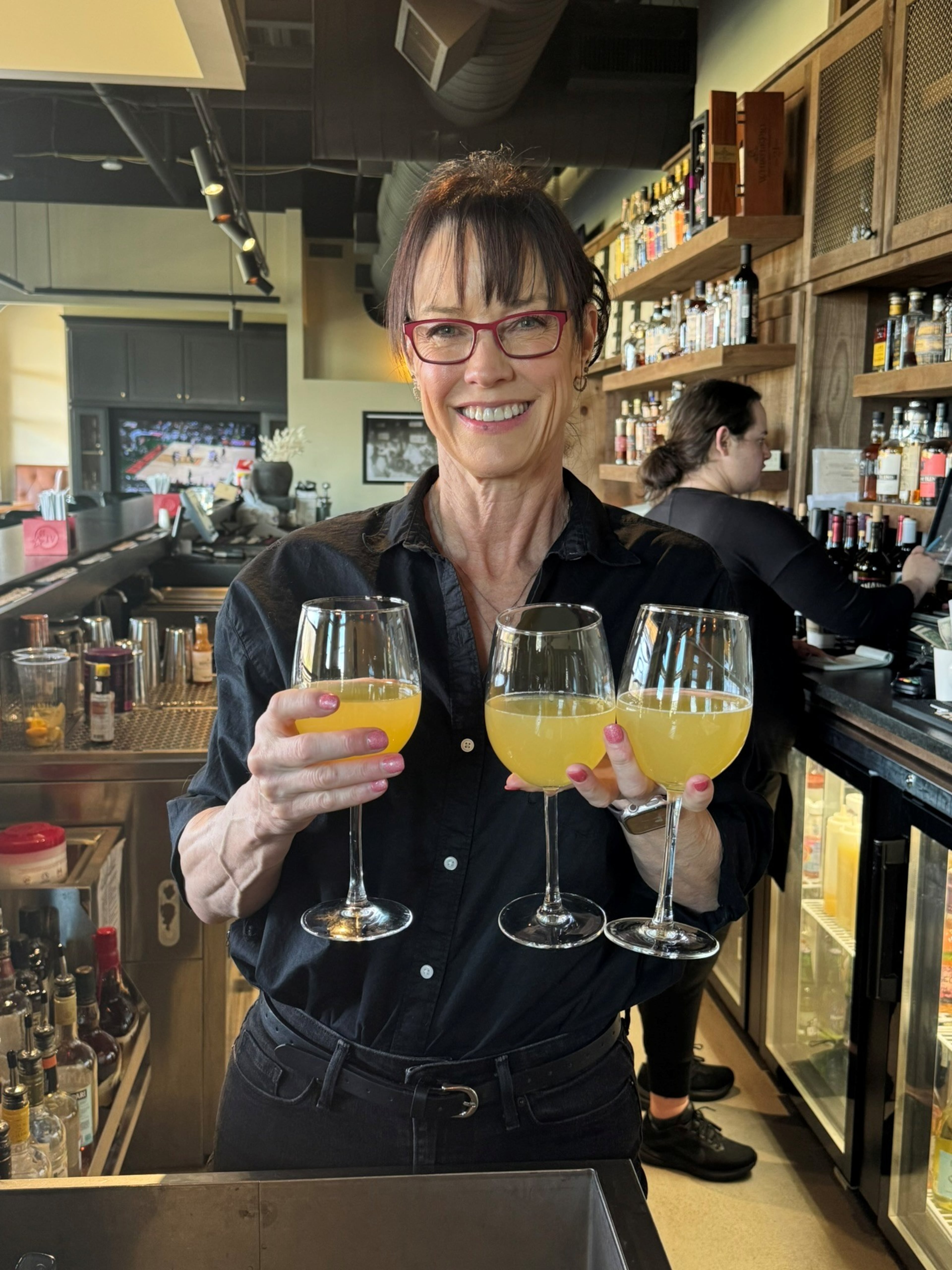Challenging but rewarding: Making a major career change later in life

When Beth Minor, 60, lost her job after 30 years in the corporate world, it was a wake-up call the former telecommunications and technology executive didn’t know she needed.
Although she’d assumed she wouldn’t work in tech forever, she’d been unable to take the leap without the extra push. “I knew the job market is tough for people my age,” she said. “But you don’t fully understand it until you’re living it.”
Newly unemployed, she initially began bartending for a friend’s new restaurant in Cumming.
“It kept me active, gave me purpose, and honestly, it was a lot of fun,” she said. Returning to her roots in hospitality after three decades was fairly effortless, “like riding a bike,” even if a bit different. Workers call out of work more frequently and there’s less fighting over shifts than she remembers from her 20s. Plus, “people ask me if I’m the owner now,” she said.

Minor applied for countless roles on platforms like LinkedIn, keeping a detailed spreadsheet just to track her progress.
“It was very frustrating,” she said. “Every application system was different, and I wasn’t getting much traction.”
Additionally, ageism is real. “The corporate world is very youth-focused, especially in tech. I could tell sometimes during interviews that my age was a factor, even if it was unspoken.”
After one year of searching, Minor said she feels lucky to have identified a suitable role working for an Italian wine importer, which combines her corporate experience with her hospitality background.
“I’ll be handling sales reporting and analytics — things I’m good at — but in a much lower-stress, more enjoyable environment.” She’s enjoyed her bartending stint so much she said she plans to continue picking up a few shifts on the weekends while working full time during the week.
After starting her new role in April, Minor learned “success looks a lot different than it did in my 30s or 40s. It’s about balance, meaningful work, and having time to enjoy life, not just climbing ladders.”
In addition to persistence and staying active, she credits her successful job search to flexibility and open-mindedness. “Don’t be afraid to pivot. You’re not starting over; you’re bringing years of experience and skills into a new chapter. It might just turn out to be your best one yet.”
From burned-out business owner to scenic semiretirement
After more than two decades of business ownership, native Atlantan Jerry Moore, now 65, started feeling burned out with running a business and managing employees. Therefore, five years ago he sold his transportation business after about two years of planning and researching his next career move.
Moore now works for the National Park Service operating equipment and heavy machinery. He enjoys traveling and has been able to visit parts of the country he’d never seen, including 11 national parks.

So far, he’s worked at the Grand Canyon, Bryce Canyon and Mesa Verde parks. He highly recommends the lifestyle for people who wish to travel the country. The scenery is unmatched and the hours are flexible, because most park jobs are for six months out of the year. He also recognizes the lifestyle isn’t for everyone, though.
“Most parks are in remote areas, so many services and amenities available in cities will not be accessible,” he explained. Also, housing for park employees often requires living with a roommate, to which he’s not amenable. Therefore, Moore lives out of his RV and travels from park to park. Additionally, NPS jobs are “not the highest paying jobs,” especially considering many are part time, and some start as low as $14-15 an hour. His entrepreneurial side-gig in photography helps supplement his income a bit.
Moore advises conducting lots of extensive research, most of which can be done online, before making a major career shift, especially one that involves a complete lifestyle change. He joined Facebook groups for people interested in travel jobs and Park Service jobs, and there are many websites devoted to these specific types of jobs.
For older adults, it’s crucial to figure out key factors like how your career transition will affect to your budget, schedule, housing, health care insurance coverage, and your Social Security benefits, he advised.
Expert advice for reinventing your career after 55
As these stories and many others reveal, making a career change later in life isn’t just about updating your resume. It often requires redefining what success looks like.
“People over 55 are more focused on purpose, lifestyle alignment and legacy,” said Kelly Johnson, MBA, Associate Certified Coach, a career transitions coach and founder of Crystal Lake Marketing & Coaching. “It’s not about chasing titles anymore. It’s about finding work that feels energizing and meaningful.”
Job seekers at this stage must also navigate age-related perceptions. “You’re not just proving your skills” in interviews. “You’re showing that you’re adaptable, current and still full of energy,” Johnson said. Demonstrating a commitment to continuous learning, e.g. obtaining new certifications, acquiring new tech skills or staying up on trends, helps combat outdated stereotypes and positions older professionals as strategic assets.
Her advice? Don’t go it alone.
“Trying to figure it out in isolation often leads to feeling stuck. The most successful transitions happen when people seek support, whether it’s from coaches or peer groups, to move forward intentionally, not reactively.”


